Rhododendron periclymenoides
Native pink azalea flowering in late spring
Rhododendron periclymenoides pink azalea
Add to MyPlants View Locations
Pink azalea, also known as pinxter flower, is a slow-growing deciduous shrub that produces delicate pink to white, funnel-shaped flowers with a light fragrance. Blooming from April through May, these showy blossoms appear just before the leaves emerge and grow in clusters of 6-12 flowers. Each flower measures about 1½ inches wide and has five long curved stamens. The stamens are two inches long and protrude well beyond the pubescent flower tube. Bees, butterflies, moths and hummingbirds are attracted to the nectar and fragrance making the shrub a valuable resource for pollinators.
The simple, alternate leaves are bright green, oval to elliptic in shape, and measure 2 to 4 inches in length. They have a smooth texture with a subtle leathery feel and transition to a dull yellow in autumn before shedding.
Pink azalea closely resembles its relative, early azalea (R. prinophyllum), but lacks the characteristic wooliness found on the buds, twigs, and undersides of its leaves. Both species are valued in the horticultural trade, tough early azalea tends to be the more popular choice. The plant can be propagated from seed or cuttings, though cuttings may require careful handling for successful rooting.
Pink azalea is native to the eastern United States, growing from 3 to 9 feet with a spread of 3-7 feet making it a natural cover for small mammals and a nesting site for birds. Found in moist forests, swamps and stream banks, it prefers dappled shade and acidic, well-drained soils though it can tolerate dry, sandy, or rocky soils. Root rot and powdery mildew can be a problem as can insects such as aphids, borers, and lace bugs. All parts of this plant contain grayanotoxins, making it poisonous to dogs, cats, horses and humans.
Habitat & Range
Common in dry woods, thickets, and stream banks. Prefers moist, well-drained, acidic soil in dappled shade.
Present throughout the state.
Range: Found throughout the eastern United States from Massachusetts to South Carolina and Tennessee.
| EMP: | FAC |
|---|---|
| NCNE: | FAC |
Phenology
Flowers in April & May, before the leaves appear.
Fruits in late summer to early winter.
Characteristics
Inflorescence terminal truss with 6 to 15 flowers each
Flowers funnel-shaped, tube is usually without gland-tipped hairs; corolla pink or white; pedicel and ovary with long nonglandular hairs; 5 protruding, curved stamens; 1½″ wide
Leaves simple, alternate, dark green, oblong to elliptic; glabrous, bristly on midrib or rarely with dense short soft hairs beneath; 2-4″ long
Stems woody, slender, grayish-brown; smoother when young, becoming furrowed, rough or shred with age
Fruit brown, hairy capsule with long nonglandular hairs
Bark grayish-brown; thin and smooth when young becoming ridged or plated with age
Twigs very slender; glabrous, bristly or rarely with soft short hairs
Buds scales glabrous; yellow-green to red-brown; pointed
Height/Spread 3-9 feet, rarely up to 12 feet tall; spreading 3-7 feet
Age 30 years or more
Fall Color dull yellow
Plant Codes
S-rank: S5 (Secure)
G-rank: G5 (Secure)
Ecology
The nectar-rich flowers attract birds, bees and butterflies with bumblebees being the main pollinator. The plant also serves as a food source for deer, which can occasionally cause damage. It is susceptible to insect problems like aphids, borers, and lace bugs as well as root rot and powdery mildew.
Rhododendron periclymenoides pink azalea
Synonyms: Rhododendron nudiflorumAdd to MyPlants View Locations
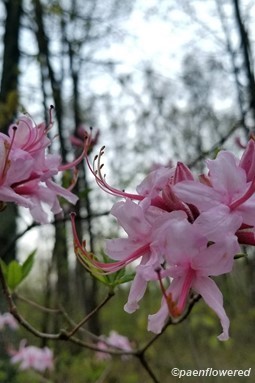
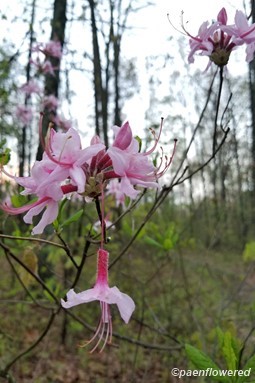
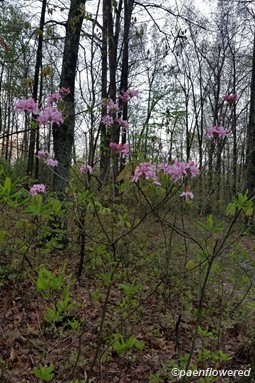
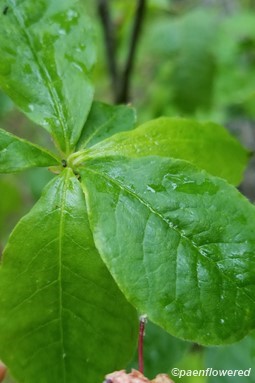
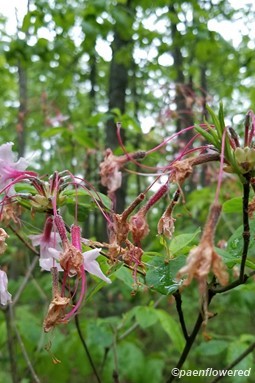
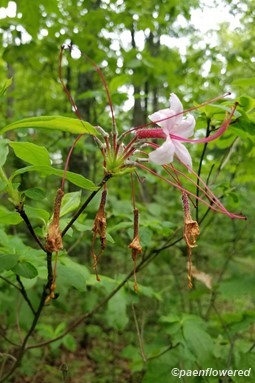






Comments
Have you spotted this plant in your area? We'd love to hear about your experience! Share your comments or questions about the plant below. Comments are moderated before posting.